Business Law Report
VerifiedAdded on 2020/02/12
|19
|6048
|244
Report
AI Summary
This report provides solutions to a business law assignment focusing on various legal aspects relevant to a business scenario involving Ben, who purchased a faulty car and intends to start a used car business. The report covers judicial regulation of silent terms, enactment provisions on property movement and possession, buyer/seller rights in sales contracts, product liability, types of credit agreements, consumer rights, agency law, monopolies and anti-competitive practices in the UK, and intellectual property rights (copyright, patents, trademarks). It analyzes relevant UK legislation and case law to advise Ben on his legal position and options. The report demonstrates a thorough understanding of business law principles and their practical application.
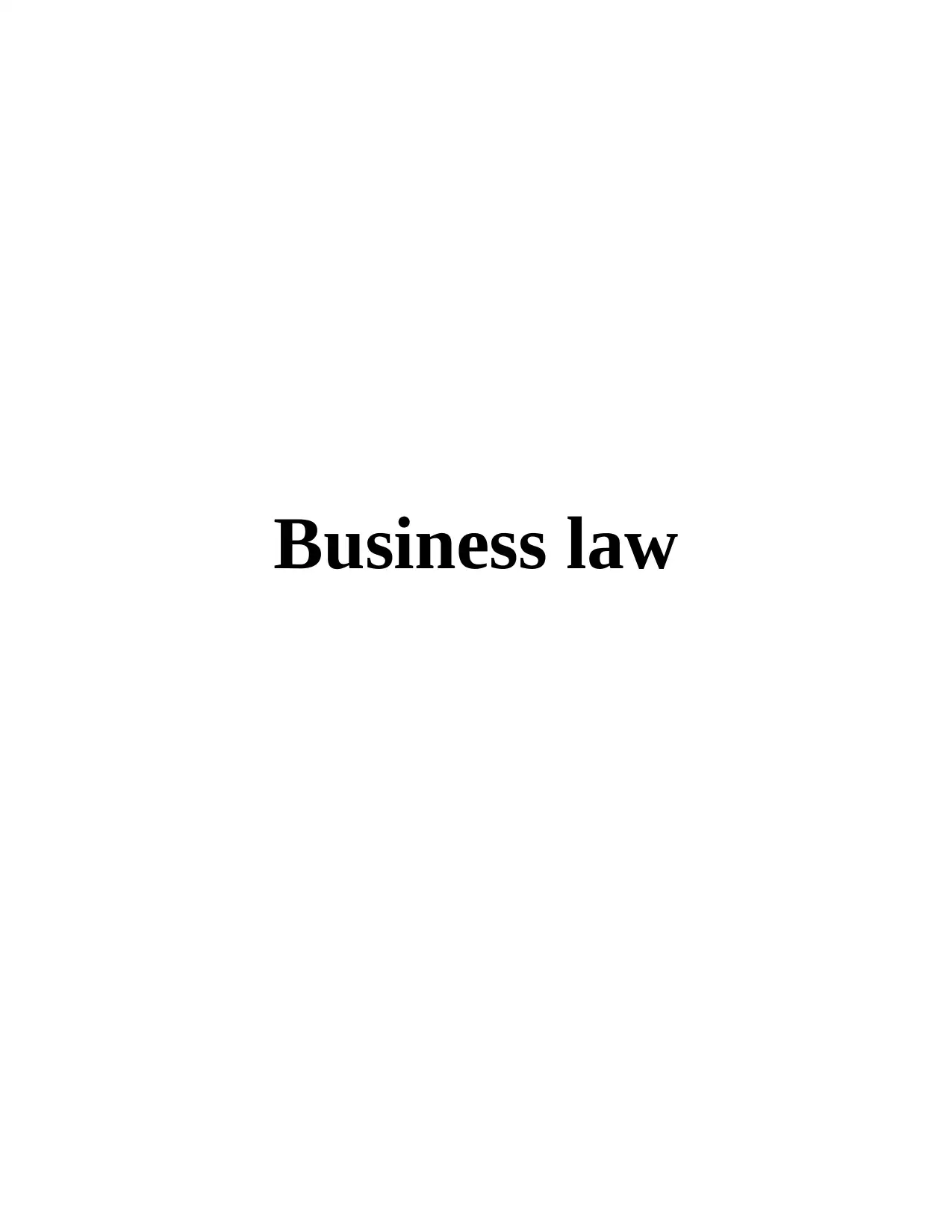
Business law
Paraphrase This Document
Need a fresh take? Get an instant paraphrase of this document with our AI Paraphraser
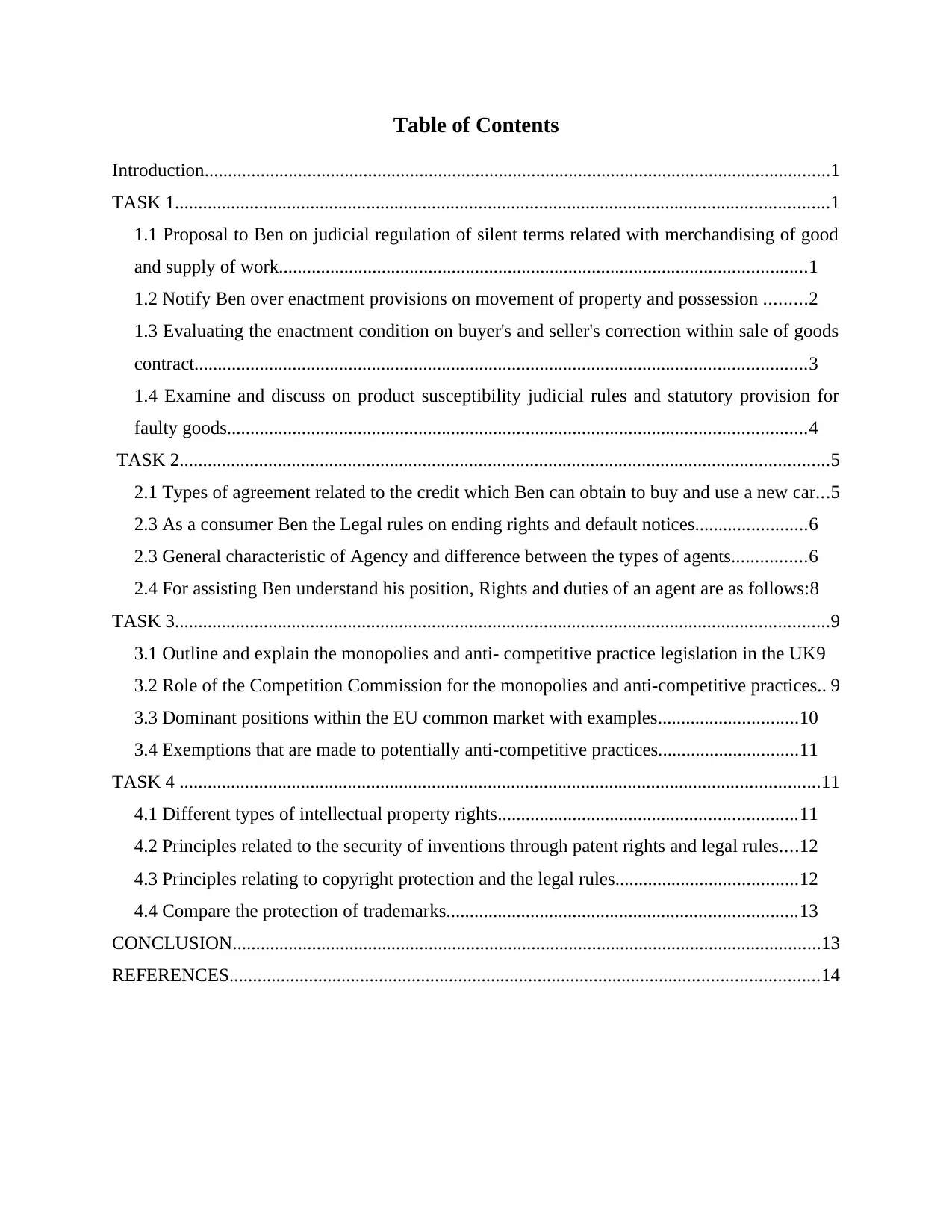
Table of Contents
Introduction......................................................................................................................................1
TASK 1............................................................................................................................................1
1.1 Proposal to Ben on judicial regulation of silent terms related with merchandising of good
and supply of work.................................................................................................................1
1.2 Notify Ben over enactment provisions on movement of property and possession .........2
1.3 Evaluating the enactment condition on buyer's and seller's correction within sale of goods
contract...................................................................................................................................3
1.4 Examine and discuss on product susceptibility judicial rules and statutory provision for
faulty goods............................................................................................................................4
TASK 2...........................................................................................................................................5
2.1 Types of agreement related to the credit which Ben can obtain to buy and use a new car...5
2.3 As a consumer Ben the Legal rules on ending rights and default notices........................6
2.3 General characteristic of Agency and difference between the types of agents................6
2.4 For assisting Ben understand his position, Rights and duties of an agent are as follows:8
TASK 3............................................................................................................................................9
3.1 Outline and explain the monopolies and anti- competitive practice legislation in the UK9
3.2 Role of the Competition Commission for the monopolies and anti-competitive practices.. 9
3.3 Dominant positions within the EU common market with examples..............................10
3.4 Exemptions that are made to potentially anti-competitive practices..............................11
TASK 4 .........................................................................................................................................11
4.1 Different types of intellectual property rights................................................................11
4.2 Principles related to the security of inventions through patent rights and legal rules....12
4.3 Principles relating to copyright protection and the legal rules.......................................12
4.4 Compare the protection of trademarks...........................................................................13
CONCLUSION..............................................................................................................................13
REFERENCES..............................................................................................................................14
Introduction......................................................................................................................................1
TASK 1............................................................................................................................................1
1.1 Proposal to Ben on judicial regulation of silent terms related with merchandising of good
and supply of work.................................................................................................................1
1.2 Notify Ben over enactment provisions on movement of property and possession .........2
1.3 Evaluating the enactment condition on buyer's and seller's correction within sale of goods
contract...................................................................................................................................3
1.4 Examine and discuss on product susceptibility judicial rules and statutory provision for
faulty goods............................................................................................................................4
TASK 2...........................................................................................................................................5
2.1 Types of agreement related to the credit which Ben can obtain to buy and use a new car...5
2.3 As a consumer Ben the Legal rules on ending rights and default notices........................6
2.3 General characteristic of Agency and difference between the types of agents................6
2.4 For assisting Ben understand his position, Rights and duties of an agent are as follows:8
TASK 3............................................................................................................................................9
3.1 Outline and explain the monopolies and anti- competitive practice legislation in the UK9
3.2 Role of the Competition Commission for the monopolies and anti-competitive practices.. 9
3.3 Dominant positions within the EU common market with examples..............................10
3.4 Exemptions that are made to potentially anti-competitive practices..............................11
TASK 4 .........................................................................................................................................11
4.1 Different types of intellectual property rights................................................................11
4.2 Principles related to the security of inventions through patent rights and legal rules....12
4.3 Principles relating to copyright protection and the legal rules.......................................12
4.4 Compare the protection of trademarks...........................................................................13
CONCLUSION..............................................................................................................................13
REFERENCES..............................................................................................................................14
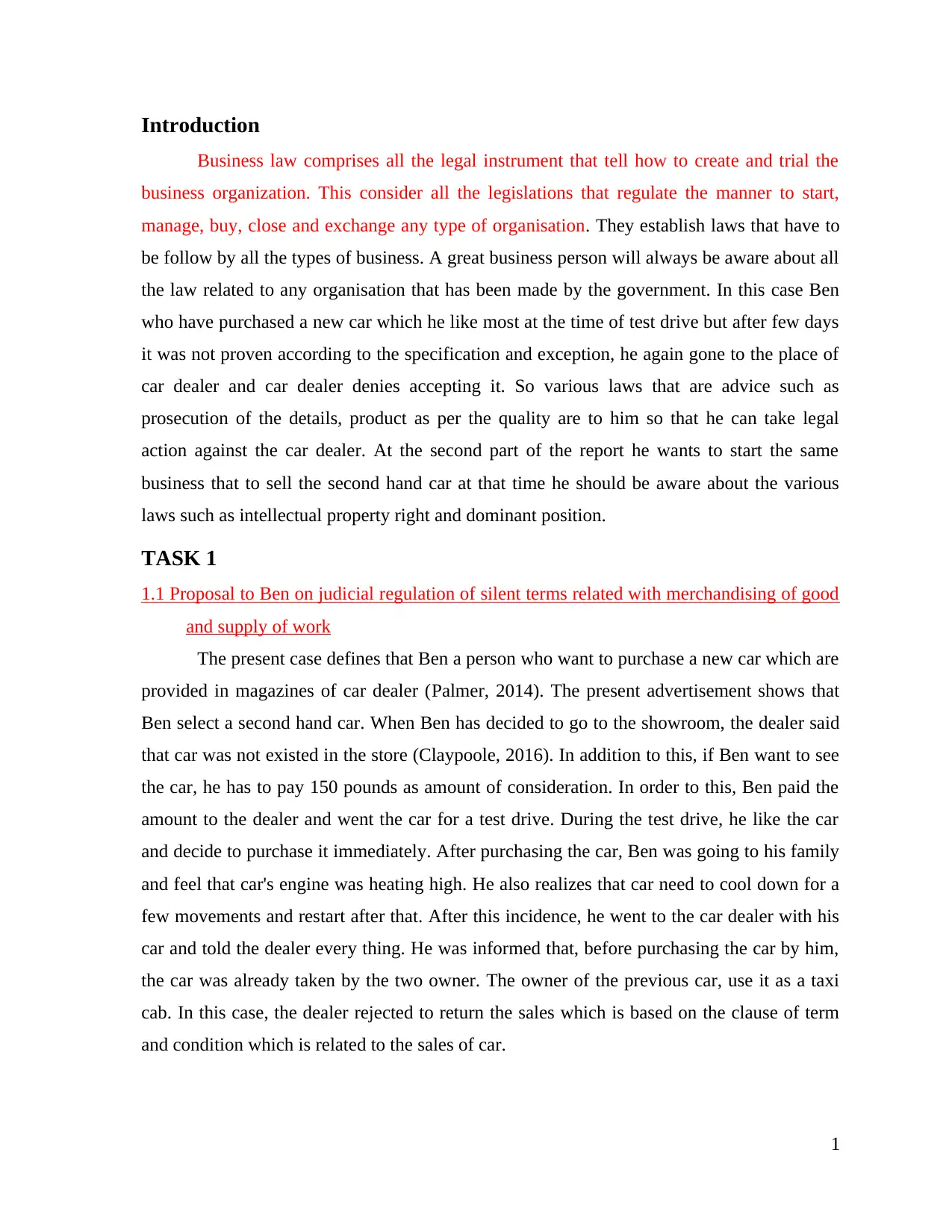
Introduction
Business law comprises all the legal instrument that tell how to create and trial the
business organization. This consider all the legislations that regulate the manner to start,
manage, buy, close and exchange any type of organisation. They establish laws that have to
be follow by all the types of business. A great business person will always be aware about all
the law related to any organisation that has been made by the government. In this case Ben
who have purchased a new car which he like most at the time of test drive but after few days
it was not proven according to the specification and exception, he again gone to the place of
car dealer and car dealer denies accepting it. So various laws that are advice such as
prosecution of the details, product as per the quality are to him so that he can take legal
action against the car dealer. At the second part of the report he wants to start the same
business that to sell the second hand car at that time he should be aware about the various
laws such as intellectual property right and dominant position.
TASK 1
1.1 Proposal to Ben on judicial regulation of silent terms related with merchandising of good
and supply of work
The present case defines that Ben a person who want to purchase a new car which are
provided in magazines of car dealer (Palmer, 2014). The present advertisement shows that
Ben select a second hand car. When Ben has decided to go to the showroom, the dealer said
that car was not existed in the store (Claypoole, 2016). In addition to this, if Ben want to see
the car, he has to pay 150 pounds as amount of consideration. In order to this, Ben paid the
amount to the dealer and went the car for a test drive. During the test drive, he like the car
and decide to purchase it immediately. After purchasing the car, Ben was going to his family
and feel that car's engine was heating high. He also realizes that car need to cool down for a
few movements and restart after that. After this incidence, he went to the car dealer with his
car and told the dealer every thing. He was informed that, before purchasing the car by him,
the car was already taken by the two owner. The owner of the previous car, use it as a taxi
cab. In this case, the dealer rejected to return the sales which is based on the clause of term
and condition which is related to the sales of car.
1
Business law comprises all the legal instrument that tell how to create and trial the
business organization. This consider all the legislations that regulate the manner to start,
manage, buy, close and exchange any type of organisation. They establish laws that have to
be follow by all the types of business. A great business person will always be aware about all
the law related to any organisation that has been made by the government. In this case Ben
who have purchased a new car which he like most at the time of test drive but after few days
it was not proven according to the specification and exception, he again gone to the place of
car dealer and car dealer denies accepting it. So various laws that are advice such as
prosecution of the details, product as per the quality are to him so that he can take legal
action against the car dealer. At the second part of the report he wants to start the same
business that to sell the second hand car at that time he should be aware about the various
laws such as intellectual property right and dominant position.
TASK 1
1.1 Proposal to Ben on judicial regulation of silent terms related with merchandising of good
and supply of work
The present case defines that Ben a person who want to purchase a new car which are
provided in magazines of car dealer (Palmer, 2014). The present advertisement shows that
Ben select a second hand car. When Ben has decided to go to the showroom, the dealer said
that car was not existed in the store (Claypoole, 2016). In addition to this, if Ben want to see
the car, he has to pay 150 pounds as amount of consideration. In order to this, Ben paid the
amount to the dealer and went the car for a test drive. During the test drive, he like the car
and decide to purchase it immediately. After purchasing the car, Ben was going to his family
and feel that car's engine was heating high. He also realizes that car need to cool down for a
few movements and restart after that. After this incidence, he went to the car dealer with his
car and told the dealer every thing. He was informed that, before purchasing the car by him,
the car was already taken by the two owner. The owner of the previous car, use it as a taxi
cab. In this case, the dealer rejected to return the sales which is based on the clause of term
and condition which is related to the sales of car.
1
⊘ This is a preview!⊘
Do you want full access?
Subscribe today to unlock all pages.

Trusted by 1+ million students worldwide
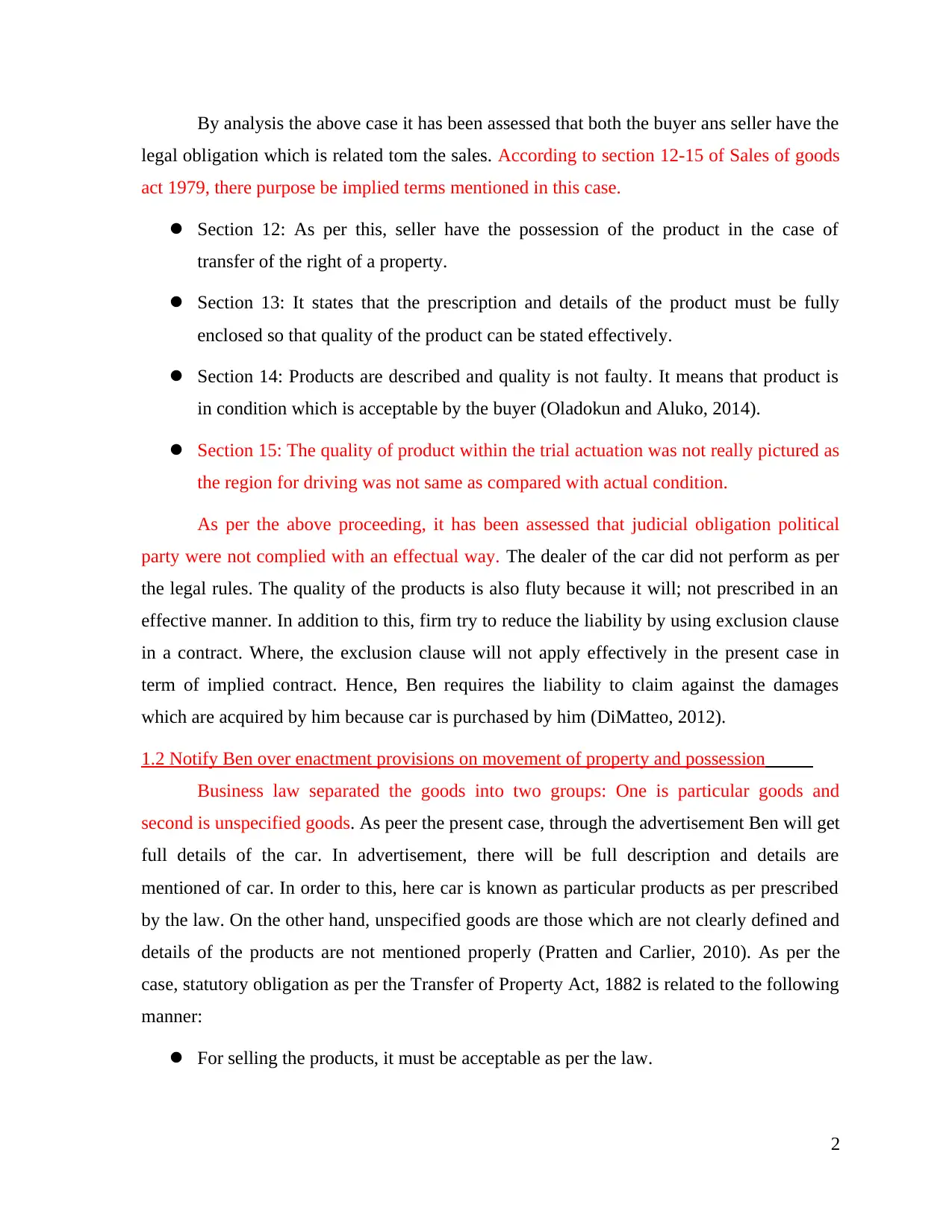
By analysis the above case it has been assessed that both the buyer ans seller have the
legal obligation which is related tom the sales. According to section 12-15 of Sales of goods
act 1979, there purpose be implied terms mentioned in this case.
Section 12: As per this, seller have the possession of the product in the case of
transfer of the right of a property.
Section 13: It states that the prescription and details of the product must be fully
enclosed so that quality of the product can be stated effectively.
Section 14: Products are described and quality is not faulty. It means that product is
in condition which is acceptable by the buyer (Oladokun and Aluko, 2014).
Section 15: The quality of product within the trial actuation was not really pictured as
the region for driving was not same as compared with actual condition.
As per the above proceeding, it has been assessed that judicial obligation political
party were not complied with an effectual way. The dealer of the car did not perform as per
the legal rules. The quality of the products is also fluty because it will; not prescribed in an
effective manner. In addition to this, firm try to reduce the liability by using exclusion clause
in a contract. Where, the exclusion clause will not apply effectively in the present case in
term of implied contract. Hence, Ben requires the liability to claim against the damages
which are acquired by him because car is purchased by him (DiMatteo, 2012).
1.2 Notify Ben over enactment provisions on movement of property and possession
Business law separated the goods into two groups: One is particular goods and
second is unspecified goods. As peer the present case, through the advertisement Ben will get
full details of the car. In advertisement, there will be full description and details are
mentioned of car. In order to this, here car is known as particular products as per prescribed
by the law. On the other hand, unspecified goods are those which are not clearly defined and
details of the products are not mentioned properly (Pratten and Carlier, 2010). As per the
case, statutory obligation as per the Transfer of Property Act, 1882 is related to the following
manner:
For selling the products, it must be acceptable as per the law.
2
legal obligation which is related tom the sales. According to section 12-15 of Sales of goods
act 1979, there purpose be implied terms mentioned in this case.
Section 12: As per this, seller have the possession of the product in the case of
transfer of the right of a property.
Section 13: It states that the prescription and details of the product must be fully
enclosed so that quality of the product can be stated effectively.
Section 14: Products are described and quality is not faulty. It means that product is
in condition which is acceptable by the buyer (Oladokun and Aluko, 2014).
Section 15: The quality of product within the trial actuation was not really pictured as
the region for driving was not same as compared with actual condition.
As per the above proceeding, it has been assessed that judicial obligation political
party were not complied with an effectual way. The dealer of the car did not perform as per
the legal rules. The quality of the products is also fluty because it will; not prescribed in an
effective manner. In addition to this, firm try to reduce the liability by using exclusion clause
in a contract. Where, the exclusion clause will not apply effectively in the present case in
term of implied contract. Hence, Ben requires the liability to claim against the damages
which are acquired by him because car is purchased by him (DiMatteo, 2012).
1.2 Notify Ben over enactment provisions on movement of property and possession
Business law separated the goods into two groups: One is particular goods and
second is unspecified goods. As peer the present case, through the advertisement Ben will get
full details of the car. In advertisement, there will be full description and details are
mentioned of car. In order to this, here car is known as particular products as per prescribed
by the law. On the other hand, unspecified goods are those which are not clearly defined and
details of the products are not mentioned properly (Pratten and Carlier, 2010). As per the
case, statutory obligation as per the Transfer of Property Act, 1882 is related to the following
manner:
For selling the products, it must be acceptable as per the law.
2
Paraphrase This Document
Need a fresh take? Get an instant paraphrase of this document with our AI Paraphraser
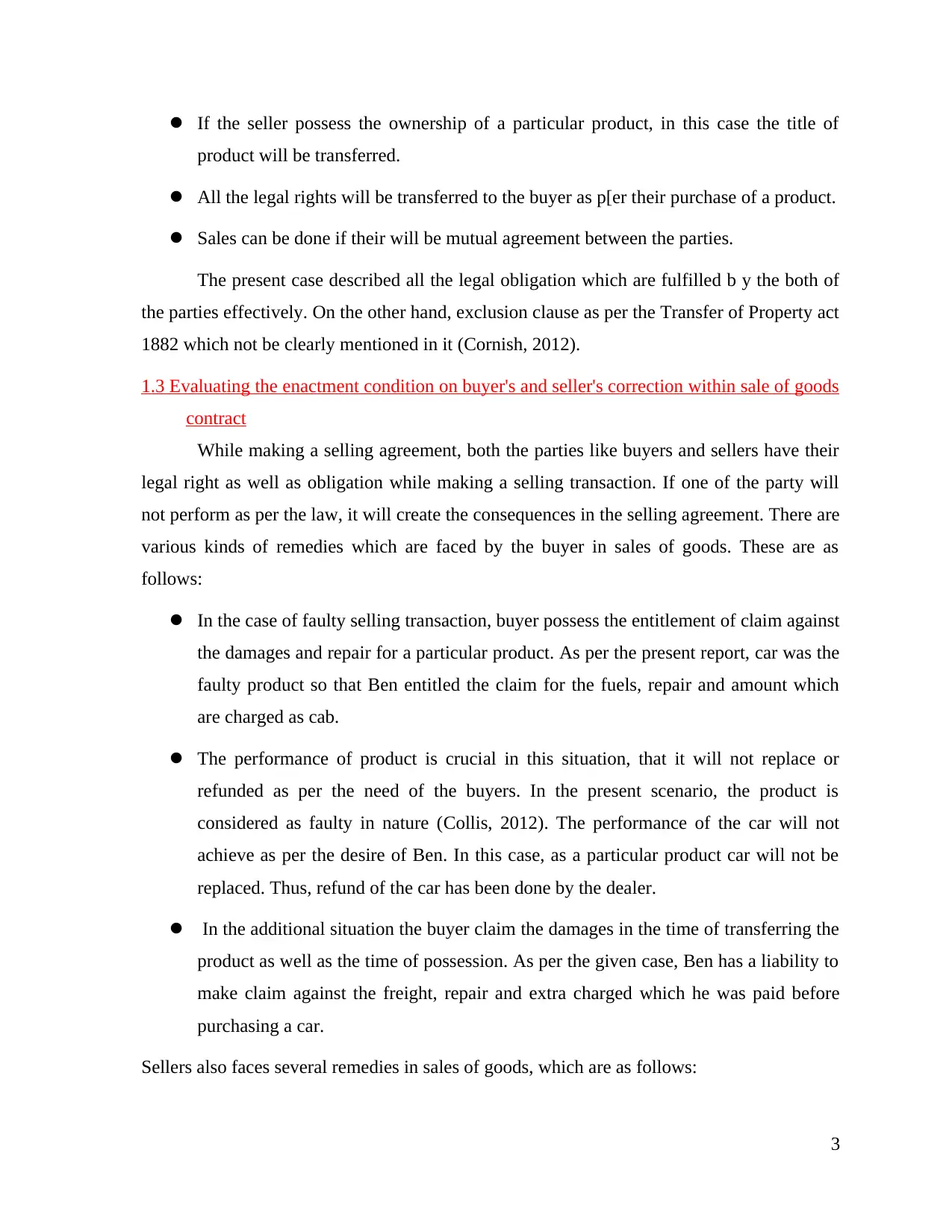
If the seller possess the ownership of a particular product, in this case the title of
product will be transferred.
All the legal rights will be transferred to the buyer as p[er their purchase of a product.
Sales can be done if their will be mutual agreement between the parties.
The present case described all the legal obligation which are fulfilled b y the both of
the parties effectively. On the other hand, exclusion clause as per the Transfer of Property act
1882 which not be clearly mentioned in it (Cornish, 2012).
1.3 Evaluating the enactment condition on buyer's and seller's correction within sale of goods
contract
While making a selling agreement, both the parties like buyers and sellers have their
legal right as well as obligation while making a selling transaction. If one of the party will
not perform as per the law, it will create the consequences in the selling agreement. There are
various kinds of remedies which are faced by the buyer in sales of goods. These are as
follows:
In the case of faulty selling transaction, buyer possess the entitlement of claim against
the damages and repair for a particular product. As per the present report, car was the
faulty product so that Ben entitled the claim for the fuels, repair and amount which
are charged as cab.
The performance of product is crucial in this situation, that it will not replace or
refunded as per the need of the buyers. In the present scenario, the product is
considered as faulty in nature (Collis, 2012). The performance of the car will not
achieve as per the desire of Ben. In this case, as a particular product car will not be
replaced. Thus, refund of the car has been done by the dealer.
In the additional situation the buyer claim the damages in the time of transferring the
product as well as the time of possession. As per the given case, Ben has a liability to
make claim against the freight, repair and extra charged which he was paid before
purchasing a car.
Sellers also faces several remedies in sales of goods, which are as follows:
3
product will be transferred.
All the legal rights will be transferred to the buyer as p[er their purchase of a product.
Sales can be done if their will be mutual agreement between the parties.
The present case described all the legal obligation which are fulfilled b y the both of
the parties effectively. On the other hand, exclusion clause as per the Transfer of Property act
1882 which not be clearly mentioned in it (Cornish, 2012).
1.3 Evaluating the enactment condition on buyer's and seller's correction within sale of goods
contract
While making a selling agreement, both the parties like buyers and sellers have their
legal right as well as obligation while making a selling transaction. If one of the party will
not perform as per the law, it will create the consequences in the selling agreement. There are
various kinds of remedies which are faced by the buyer in sales of goods. These are as
follows:
In the case of faulty selling transaction, buyer possess the entitlement of claim against
the damages and repair for a particular product. As per the present report, car was the
faulty product so that Ben entitled the claim for the fuels, repair and amount which
are charged as cab.
The performance of product is crucial in this situation, that it will not replace or
refunded as per the need of the buyers. In the present scenario, the product is
considered as faulty in nature (Collis, 2012). The performance of the car will not
achieve as per the desire of Ben. In this case, as a particular product car will not be
replaced. Thus, refund of the car has been done by the dealer.
In the additional situation the buyer claim the damages in the time of transferring the
product as well as the time of possession. As per the given case, Ben has a liability to
make claim against the freight, repair and extra charged which he was paid before
purchasing a car.
Sellers also faces several remedies in sales of goods, which are as follows:
3
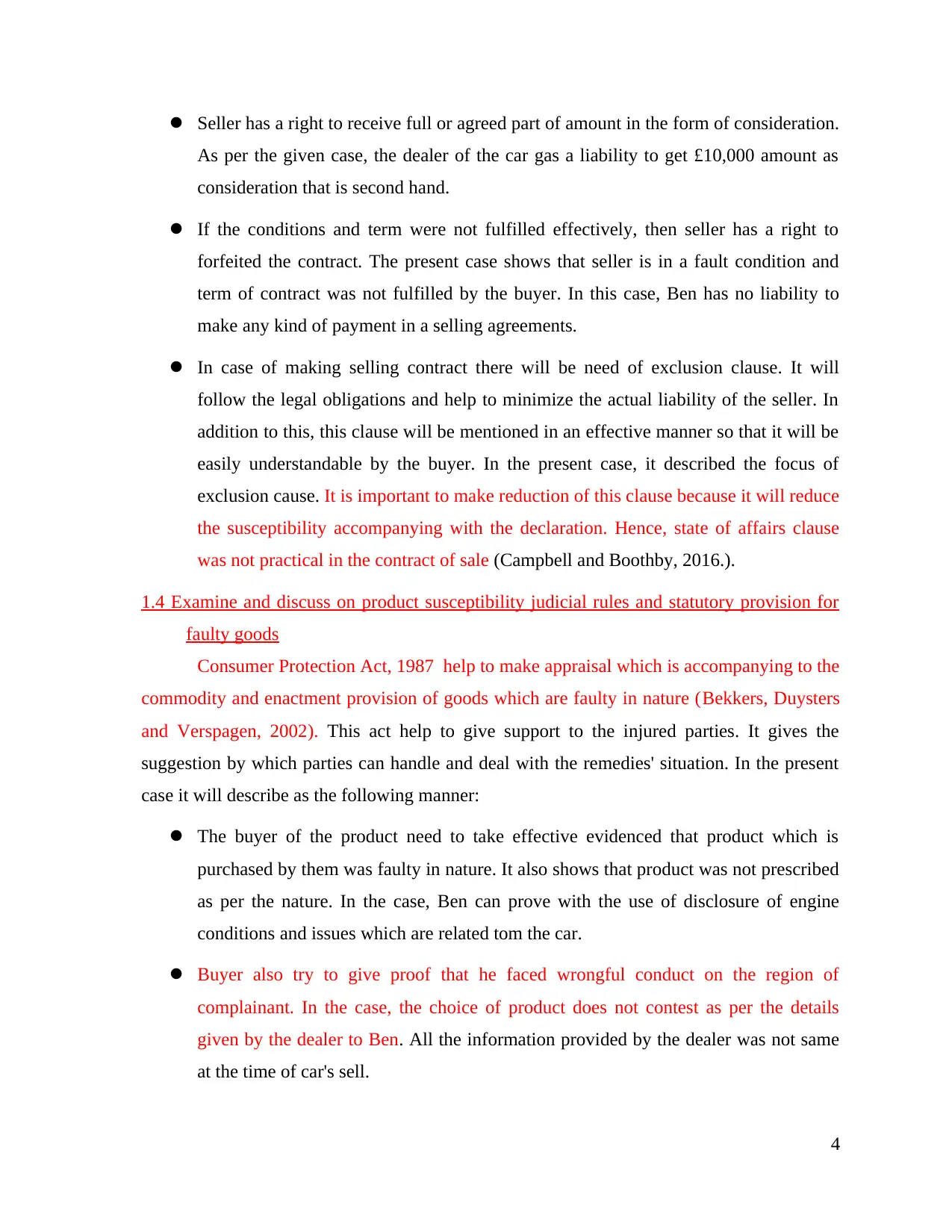
Seller has a right to receive full or agreed part of amount in the form of consideration.
As per the given case, the dealer of the car gas a liability to get £10,000 amount as
consideration that is second hand.
If the conditions and term were not fulfilled effectively, then seller has a right to
forfeited the contract. The present case shows that seller is in a fault condition and
term of contract was not fulfilled by the buyer. In this case, Ben has no liability to
make any kind of payment in a selling agreements.
In case of making selling contract there will be need of exclusion clause. It will
follow the legal obligations and help to minimize the actual liability of the seller. In
addition to this, this clause will be mentioned in an effective manner so that it will be
easily understandable by the buyer. In the present case, it described the focus of
exclusion cause. It is important to make reduction of this clause because it will reduce
the susceptibility accompanying with the declaration. Hence, state of affairs clause
was not practical in the contract of sale (Campbell and Boothby, 2016.).
1.4 Examine and discuss on product susceptibility judicial rules and statutory provision for
faulty goods
Consumer Protection Act, 1987 help to make appraisal which is accompanying to the
commodity and enactment provision of goods which are faulty in nature (Bekkers, Duysters
and Verspagen, 2002). This act help to give support to the injured parties. It gives the
suggestion by which parties can handle and deal with the remedies' situation. In the present
case it will describe as the following manner:
The buyer of the product need to take effective evidenced that product which is
purchased by them was faulty in nature. It also shows that product was not prescribed
as per the nature. In the case, Ben can prove with the use of disclosure of engine
conditions and issues which are related tom the car.
Buyer also try to give proof that he faced wrongful conduct on the region of
complainant. In the case, the choice of product does not contest as per the details
given by the dealer to Ben. All the information provided by the dealer was not same
at the time of car's sell.
4
As per the given case, the dealer of the car gas a liability to get £10,000 amount as
consideration that is second hand.
If the conditions and term were not fulfilled effectively, then seller has a right to
forfeited the contract. The present case shows that seller is in a fault condition and
term of contract was not fulfilled by the buyer. In this case, Ben has no liability to
make any kind of payment in a selling agreements.
In case of making selling contract there will be need of exclusion clause. It will
follow the legal obligations and help to minimize the actual liability of the seller. In
addition to this, this clause will be mentioned in an effective manner so that it will be
easily understandable by the buyer. In the present case, it described the focus of
exclusion cause. It is important to make reduction of this clause because it will reduce
the susceptibility accompanying with the declaration. Hence, state of affairs clause
was not practical in the contract of sale (Campbell and Boothby, 2016.).
1.4 Examine and discuss on product susceptibility judicial rules and statutory provision for
faulty goods
Consumer Protection Act, 1987 help to make appraisal which is accompanying to the
commodity and enactment provision of goods which are faulty in nature (Bekkers, Duysters
and Verspagen, 2002). This act help to give support to the injured parties. It gives the
suggestion by which parties can handle and deal with the remedies' situation. In the present
case it will describe as the following manner:
The buyer of the product need to take effective evidenced that product which is
purchased by them was faulty in nature. It also shows that product was not prescribed
as per the nature. In the case, Ben can prove with the use of disclosure of engine
conditions and issues which are related tom the car.
Buyer also try to give proof that he faced wrongful conduct on the region of
complainant. In the case, the choice of product does not contest as per the details
given by the dealer to Ben. All the information provided by the dealer was not same
at the time of car's sell.
4
⊘ This is a preview!⊘
Do you want full access?
Subscribe today to unlock all pages.

Trusted by 1+ million students worldwide
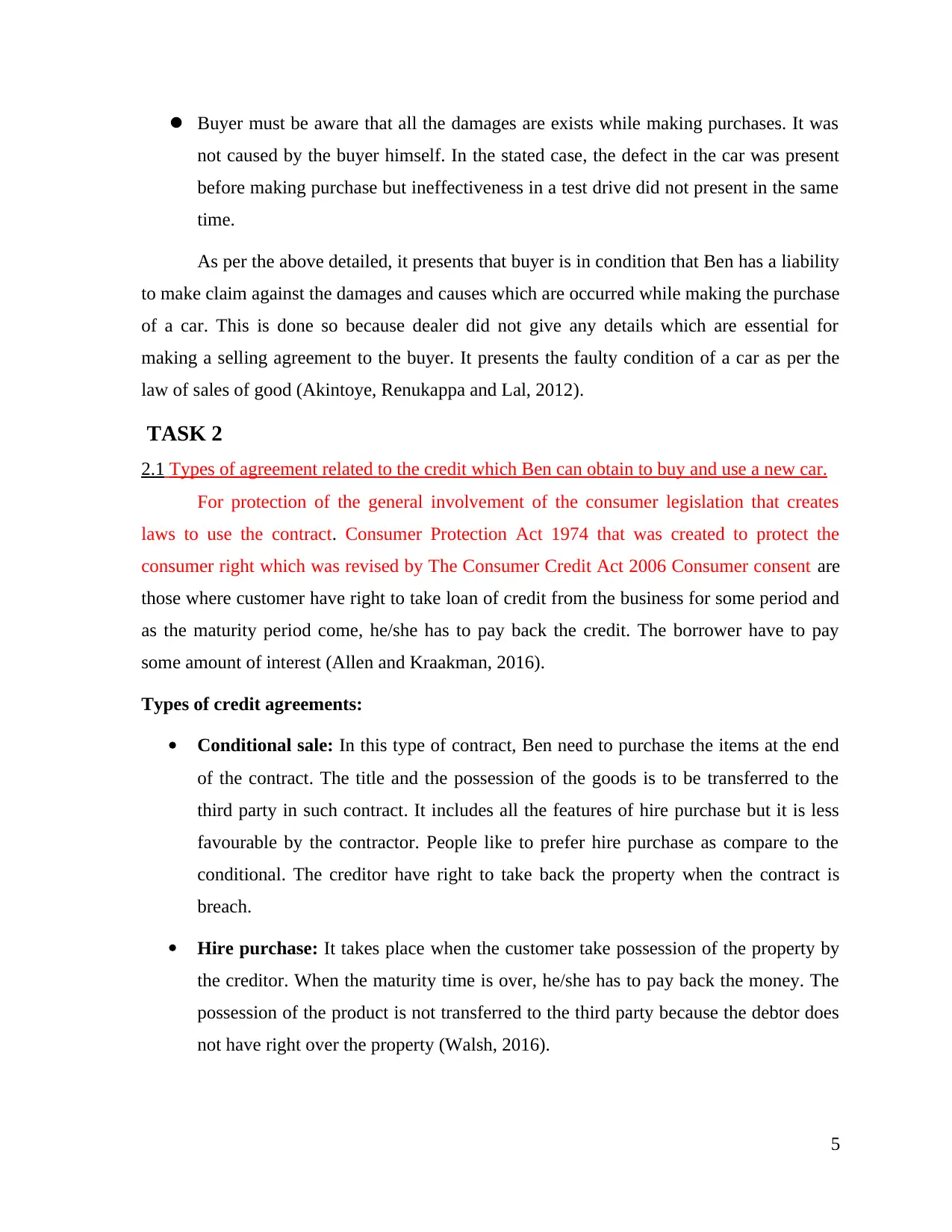
Buyer must be aware that all the damages are exists while making purchases. It was
not caused by the buyer himself. In the stated case, the defect in the car was present
before making purchase but ineffectiveness in a test drive did not present in the same
time.
As per the above detailed, it presents that buyer is in condition that Ben has a liability
to make claim against the damages and causes which are occurred while making the purchase
of a car. This is done so because dealer did not give any details which are essential for
making a selling agreement to the buyer. It presents the faulty condition of a car as per the
law of sales of good (Akintoye, Renukappa and Lal, 2012).
TASK 2
2.1 Types of agreement related to the credit which Ben can obtain to buy and use a new car.
For protection of the general involvement of the consumer legislation that creates
laws to use the contract. Consumer Protection Act 1974 that was created to protect the
consumer right which was revised by The Consumer Credit Act 2006 Consumer consent are
those where customer have right to take loan of credit from the business for some period and
as the maturity period come, he/she has to pay back the credit. The borrower have to pay
some amount of interest (Allen and Kraakman, 2016).
Types of credit agreements:
Conditional sale: In this type of contract, Ben need to purchase the items at the end
of the contract. The title and the possession of the goods is to be transferred to the
third party in such contract. It includes all the features of hire purchase but it is less
favourable by the contractor. People like to prefer hire purchase as compare to the
conditional. The creditor have right to take back the property when the contract is
breach.
Hire purchase: It takes place when the customer take possession of the property by
the creditor. When the maturity time is over, he/she has to pay back the money. The
possession of the product is not transferred to the third party because the debtor does
not have right over the property (Walsh, 2016).
5
not caused by the buyer himself. In the stated case, the defect in the car was present
before making purchase but ineffectiveness in a test drive did not present in the same
time.
As per the above detailed, it presents that buyer is in condition that Ben has a liability
to make claim against the damages and causes which are occurred while making the purchase
of a car. This is done so because dealer did not give any details which are essential for
making a selling agreement to the buyer. It presents the faulty condition of a car as per the
law of sales of good (Akintoye, Renukappa and Lal, 2012).
TASK 2
2.1 Types of agreement related to the credit which Ben can obtain to buy and use a new car.
For protection of the general involvement of the consumer legislation that creates
laws to use the contract. Consumer Protection Act 1974 that was created to protect the
consumer right which was revised by The Consumer Credit Act 2006 Consumer consent are
those where customer have right to take loan of credit from the business for some period and
as the maturity period come, he/she has to pay back the credit. The borrower have to pay
some amount of interest (Allen and Kraakman, 2016).
Types of credit agreements:
Conditional sale: In this type of contract, Ben need to purchase the items at the end
of the contract. The title and the possession of the goods is to be transferred to the
third party in such contract. It includes all the features of hire purchase but it is less
favourable by the contractor. People like to prefer hire purchase as compare to the
conditional. The creditor have right to take back the property when the contract is
breach.
Hire purchase: It takes place when the customer take possession of the property by
the creditor. When the maturity time is over, he/she has to pay back the money. The
possession of the product is not transferred to the third party because the debtor does
not have right over the property (Walsh, 2016).
5
Paraphrase This Document
Need a fresh take? Get an instant paraphrase of this document with our AI Paraphraser
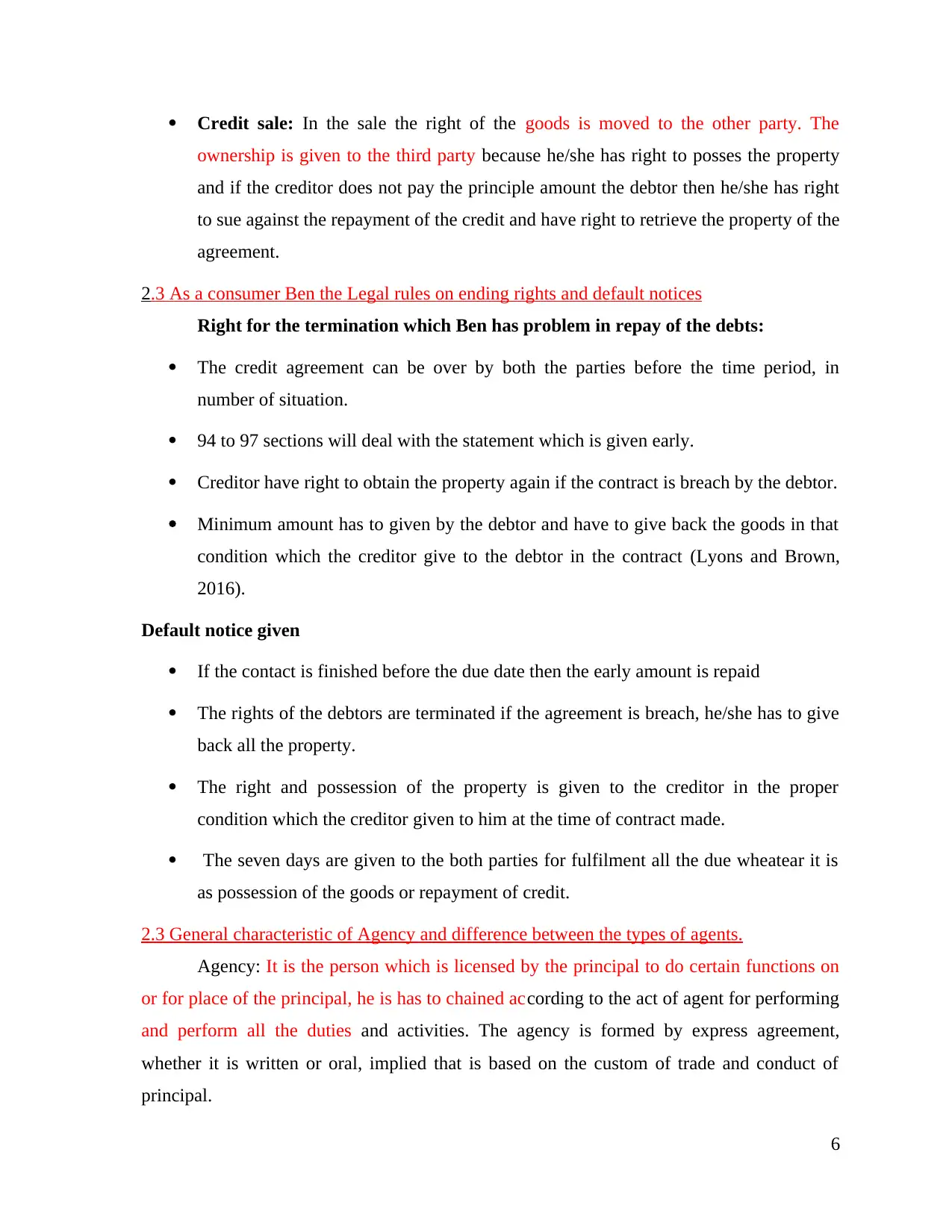
Credit sale: In the sale the right of the goods is moved to the other party. The
ownership is given to the third party because he/she has right to posses the property
and if the creditor does not pay the principle amount the debtor then he/she has right
to sue against the repayment of the credit and have right to retrieve the property of the
agreement.
2.3 As a consumer Ben the Legal rules on ending rights and default notices
Right for the termination which Ben has problem in repay of the debts:
The credit agreement can be over by both the parties before the time period, in
number of situation.
94 to 97 sections will deal with the statement which is given early.
Creditor have right to obtain the property again if the contract is breach by the debtor.
Minimum amount has to given by the debtor and have to give back the goods in that
condition which the creditor give to the debtor in the contract (Lyons and Brown,
2016).
Default notice given
If the contact is finished before the due date then the early amount is repaid
The rights of the debtors are terminated if the agreement is breach, he/she has to give
back all the property.
The right and possession of the property is given to the creditor in the proper
condition which the creditor given to him at the time of contract made.
The seven days are given to the both parties for fulfilment all the due wheatear it is
as possession of the goods or repayment of credit.
2.3 General characteristic of Agency and difference between the types of agents.
Agency: It is the person which is licensed by the principal to do certain functions on
or for place of the principal, he is has to chained according to the act of agent for performing
and perform all the duties and activities. The agency is formed by express agreement,
whether it is written or oral, implied that is based on the custom of trade and conduct of
principal.
6
ownership is given to the third party because he/she has right to posses the property
and if the creditor does not pay the principle amount the debtor then he/she has right
to sue against the repayment of the credit and have right to retrieve the property of the
agreement.
2.3 As a consumer Ben the Legal rules on ending rights and default notices
Right for the termination which Ben has problem in repay of the debts:
The credit agreement can be over by both the parties before the time period, in
number of situation.
94 to 97 sections will deal with the statement which is given early.
Creditor have right to obtain the property again if the contract is breach by the debtor.
Minimum amount has to given by the debtor and have to give back the goods in that
condition which the creditor give to the debtor in the contract (Lyons and Brown,
2016).
Default notice given
If the contact is finished before the due date then the early amount is repaid
The rights of the debtors are terminated if the agreement is breach, he/she has to give
back all the property.
The right and possession of the property is given to the creditor in the proper
condition which the creditor given to him at the time of contract made.
The seven days are given to the both parties for fulfilment all the due wheatear it is
as possession of the goods or repayment of credit.
2.3 General characteristic of Agency and difference between the types of agents.
Agency: It is the person which is licensed by the principal to do certain functions on
or for place of the principal, he is has to chained according to the act of agent for performing
and perform all the duties and activities. The agency is formed by express agreement,
whether it is written or oral, implied that is based on the custom of trade and conduct of
principal.
6
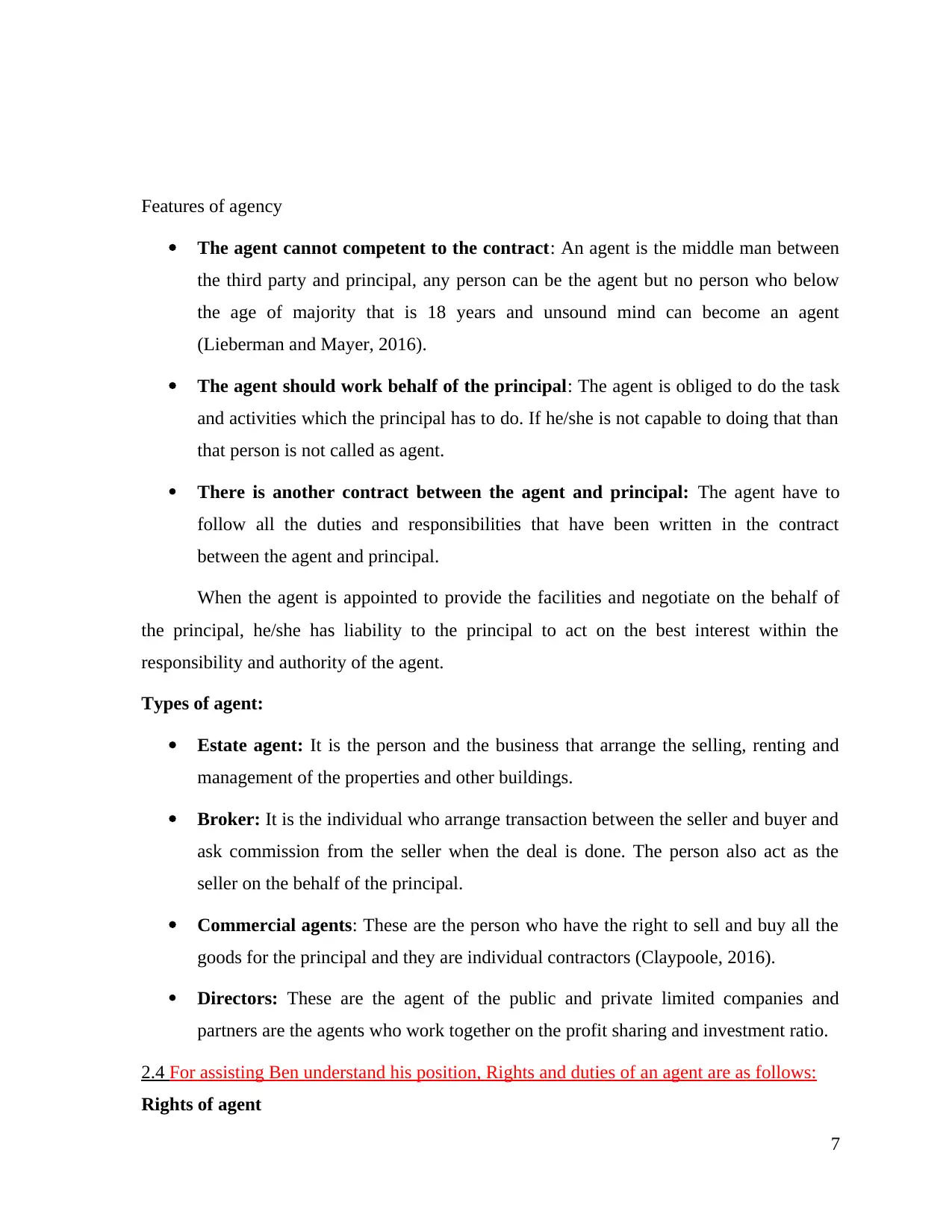
Features of agency
The agent cannot competent to the contract: An agent is the middle man between
the third party and principal, any person can be the agent but no person who below
the age of majority that is 18 years and unsound mind can become an agent
(Lieberman and Mayer, 2016).
The agent should work behalf of the principal: The agent is obliged to do the task
and activities which the principal has to do. If he/she is not capable to doing that than
that person is not called as agent.
There is another contract between the agent and principal: The agent have to
follow all the duties and responsibilities that have been written in the contract
between the agent and principal.
When the agent is appointed to provide the facilities and negotiate on the behalf of
the principal, he/she has liability to the principal to act on the best interest within the
responsibility and authority of the agent.
Types of agent:
Estate agent: It is the person and the business that arrange the selling, renting and
management of the properties and other buildings.
Broker: It is the individual who arrange transaction between the seller and buyer and
ask commission from the seller when the deal is done. The person also act as the
seller on the behalf of the principal.
Commercial agents: These are the person who have the right to sell and buy all the
goods for the principal and they are individual contractors (Claypoole, 2016).
Directors: These are the agent of the public and private limited companies and
partners are the agents who work together on the profit sharing and investment ratio.
2.4 For assisting Ben understand his position, Rights and duties of an agent are as follows:
Rights of agent
7
The agent cannot competent to the contract: An agent is the middle man between
the third party and principal, any person can be the agent but no person who below
the age of majority that is 18 years and unsound mind can become an agent
(Lieberman and Mayer, 2016).
The agent should work behalf of the principal: The agent is obliged to do the task
and activities which the principal has to do. If he/she is not capable to doing that than
that person is not called as agent.
There is another contract between the agent and principal: The agent have to
follow all the duties and responsibilities that have been written in the contract
between the agent and principal.
When the agent is appointed to provide the facilities and negotiate on the behalf of
the principal, he/she has liability to the principal to act on the best interest within the
responsibility and authority of the agent.
Types of agent:
Estate agent: It is the person and the business that arrange the selling, renting and
management of the properties and other buildings.
Broker: It is the individual who arrange transaction between the seller and buyer and
ask commission from the seller when the deal is done. The person also act as the
seller on the behalf of the principal.
Commercial agents: These are the person who have the right to sell and buy all the
goods for the principal and they are individual contractors (Claypoole, 2016).
Directors: These are the agent of the public and private limited companies and
partners are the agents who work together on the profit sharing and investment ratio.
2.4 For assisting Ben understand his position, Rights and duties of an agent are as follows:
Rights of agent
7
⊘ This is a preview!⊘
Do you want full access?
Subscribe today to unlock all pages.

Trusted by 1+ million students worldwide
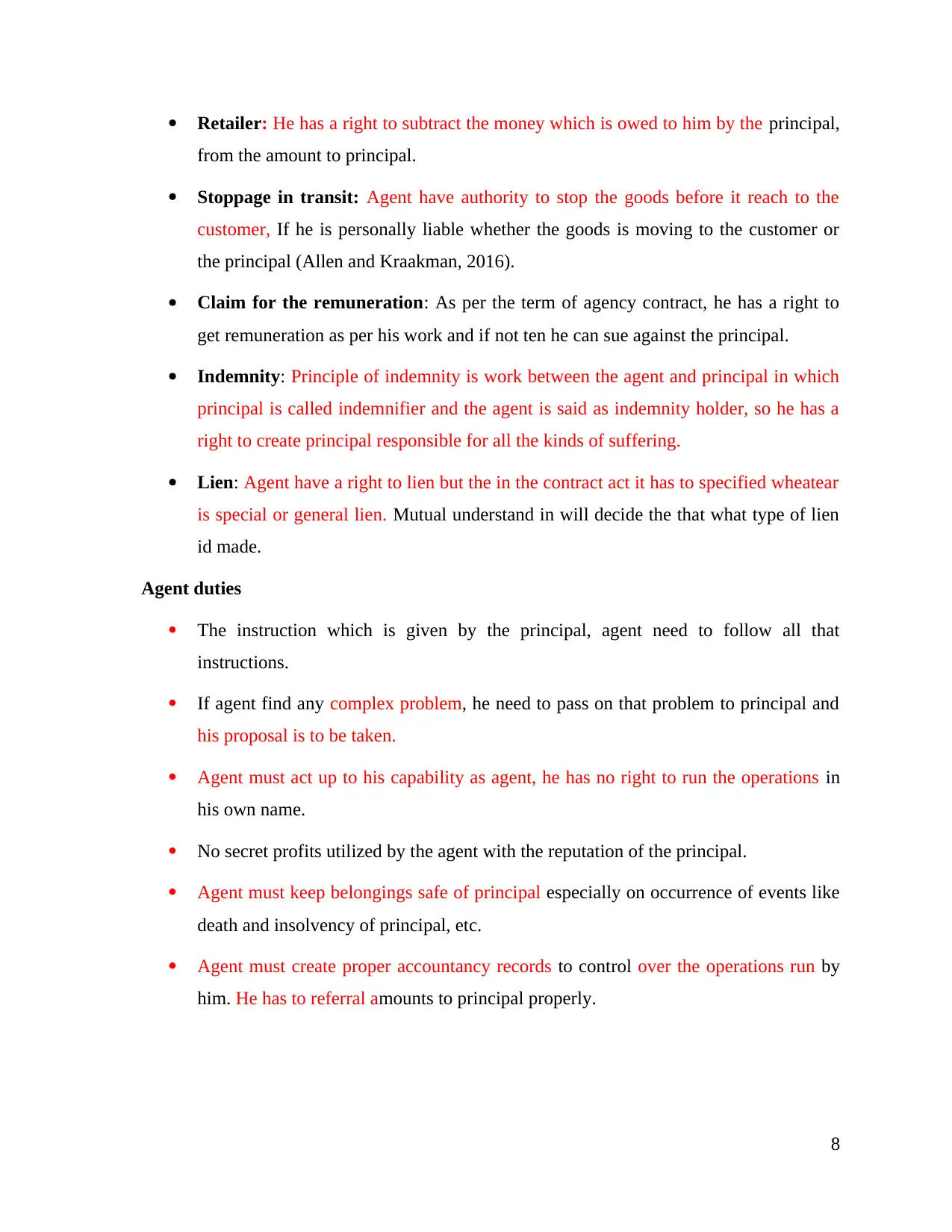
Retailer: He has a right to subtract the money which is owed to him by the principal,
from the amount to principal.
Stoppage in transit: Agent have authority to stop the goods before it reach to the
customer, If he is personally liable whether the goods is moving to the customer or
the principal (Allen and Kraakman, 2016).
Claim for the remuneration: As per the term of agency contract, he has a right to
get remuneration as per his work and if not ten he can sue against the principal.
Indemnity: Principle of indemnity is work between the agent and principal in which
principal is called indemnifier and the agent is said as indemnity holder, so he has a
right to create principal responsible for all the kinds of suffering.
Lien: Agent have a right to lien but the in the contract act it has to specified wheatear
is special or general lien. Mutual understand in will decide the that what type of lien
id made.
Agent duties
The instruction which is given by the principal, agent need to follow all that
instructions.
If agent find any complex problem, he need to pass on that problem to principal and
his proposal is to be taken.
Agent must act up to his capability as agent, he has no right to run the operations in
his own name.
No secret profits utilized by the agent with the reputation of the principal.
Agent must keep belongings safe of principal especially on occurrence of events like
death and insolvency of principal, etc.
Agent must create proper accountancy records to control over the operations run by
him. He has to referral amounts to principal properly.
8
from the amount to principal.
Stoppage in transit: Agent have authority to stop the goods before it reach to the
customer, If he is personally liable whether the goods is moving to the customer or
the principal (Allen and Kraakman, 2016).
Claim for the remuneration: As per the term of agency contract, he has a right to
get remuneration as per his work and if not ten he can sue against the principal.
Indemnity: Principle of indemnity is work between the agent and principal in which
principal is called indemnifier and the agent is said as indemnity holder, so he has a
right to create principal responsible for all the kinds of suffering.
Lien: Agent have a right to lien but the in the contract act it has to specified wheatear
is special or general lien. Mutual understand in will decide the that what type of lien
id made.
Agent duties
The instruction which is given by the principal, agent need to follow all that
instructions.
If agent find any complex problem, he need to pass on that problem to principal and
his proposal is to be taken.
Agent must act up to his capability as agent, he has no right to run the operations in
his own name.
No secret profits utilized by the agent with the reputation of the principal.
Agent must keep belongings safe of principal especially on occurrence of events like
death and insolvency of principal, etc.
Agent must create proper accountancy records to control over the operations run by
him. He has to referral amounts to principal properly.
8
Paraphrase This Document
Need a fresh take? Get an instant paraphrase of this document with our AI Paraphraser
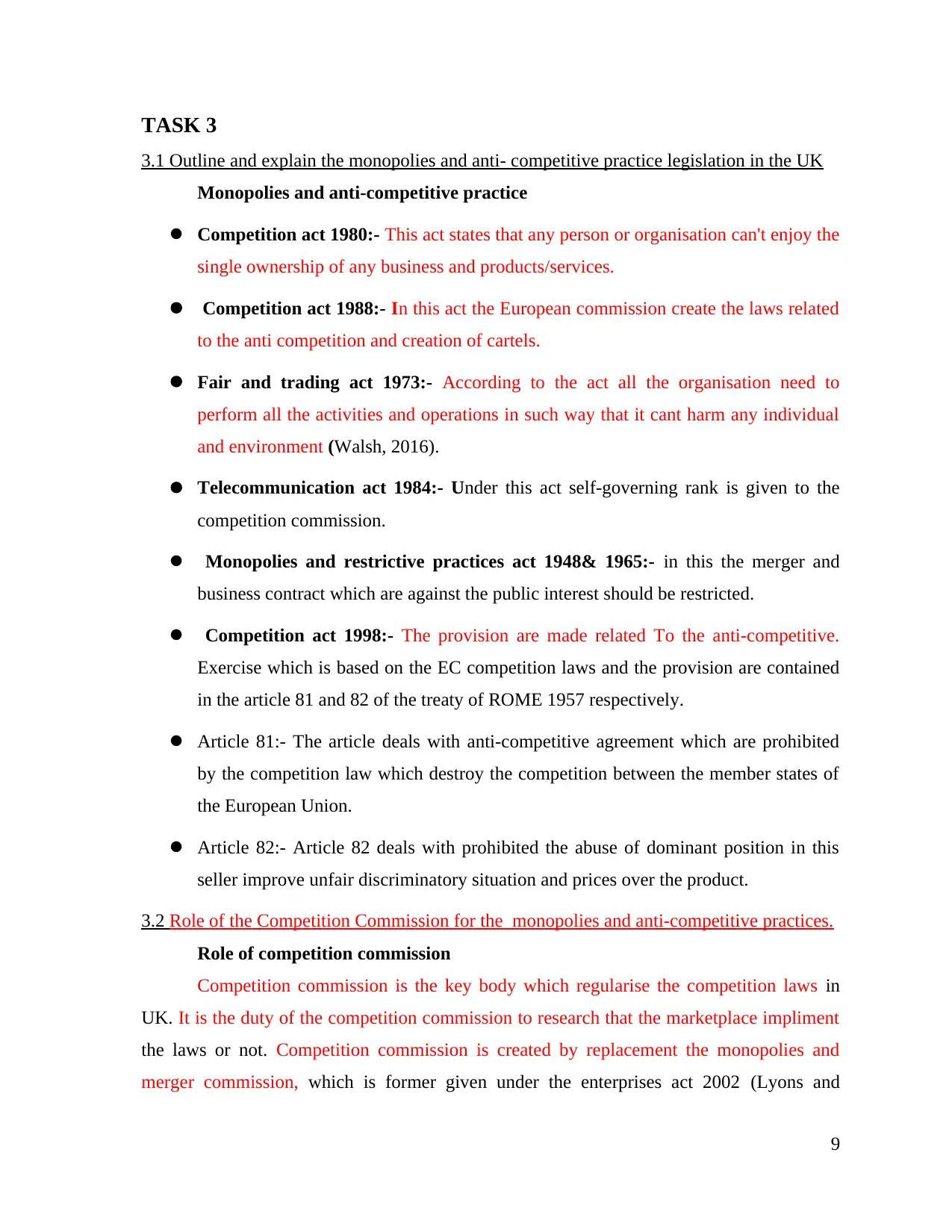
TASK 3
3.1 Outline and explain the monopolies and anti- competitive practice legislation in the UK
Monopolies and anti-competitive practice
Competition act 1980:- This act states that any person or organisation can't enjoy the
single ownership of any business and products/services.
Competition act 1988:- In this act the European commission create the laws related
to the anti competition and creation of cartels.
Fair and trading act 1973:- According to the act all the organisation need to
perform all the activities and operations in such way that it cant harm any individual
and environment (Walsh, 2016).
Telecommunication act 1984:- Under this act self-governing rank is given to the
competition commission.
Monopolies and restrictive practices act 1948& 1965:- in this the merger and
business contract which are against the public interest should be restricted.
Competition act 1998:- The provision are made related To the anti-competitive.
Exercise which is based on the EC competition laws and the provision are contained
in the article 81 and 82 of the treaty of ROME 1957 respectively.
Article 81:- The article deals with anti-competitive agreement which are prohibited
by the competition law which destroy the competition between the member states of
the European Union.
Article 82:- Article 82 deals with prohibited the abuse of dominant position in this
seller improve unfair discriminatory situation and prices over the product.
3.2 Role of the Competition Commission for the monopolies and anti-competitive practices.
Role of competition commission
Competition commission is the key body which regularise the competition laws in
UK. It is the duty of the competition commission to research that the marketplace impliment
the laws or not. Competition commission is created by replacement the monopolies and
merger commission, which is former given under the enterprises act 2002 (Lyons and
9
3.1 Outline and explain the monopolies and anti- competitive practice legislation in the UK
Monopolies and anti-competitive practice
Competition act 1980:- This act states that any person or organisation can't enjoy the
single ownership of any business and products/services.
Competition act 1988:- In this act the European commission create the laws related
to the anti competition and creation of cartels.
Fair and trading act 1973:- According to the act all the organisation need to
perform all the activities and operations in such way that it cant harm any individual
and environment (Walsh, 2016).
Telecommunication act 1984:- Under this act self-governing rank is given to the
competition commission.
Monopolies and restrictive practices act 1948& 1965:- in this the merger and
business contract which are against the public interest should be restricted.
Competition act 1998:- The provision are made related To the anti-competitive.
Exercise which is based on the EC competition laws and the provision are contained
in the article 81 and 82 of the treaty of ROME 1957 respectively.
Article 81:- The article deals with anti-competitive agreement which are prohibited
by the competition law which destroy the competition between the member states of
the European Union.
Article 82:- Article 82 deals with prohibited the abuse of dominant position in this
seller improve unfair discriminatory situation and prices over the product.
3.2 Role of the Competition Commission for the monopolies and anti-competitive practices.
Role of competition commission
Competition commission is the key body which regularise the competition laws in
UK. It is the duty of the competition commission to research that the marketplace impliment
the laws or not. Competition commission is created by replacement the monopolies and
merger commission, which is former given under the enterprises act 2002 (Lyons and
9
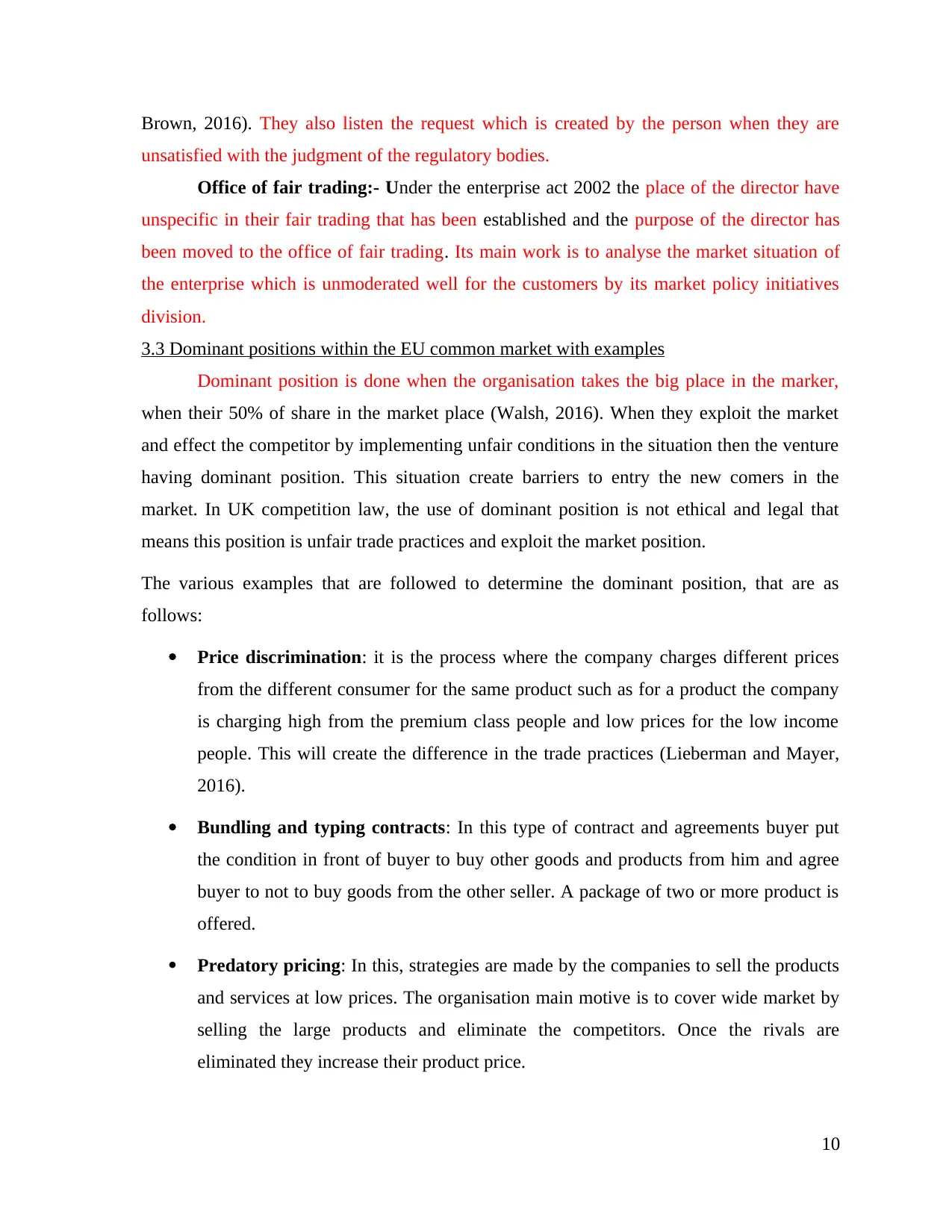
Brown, 2016). They also listen the request which is created by the person when they are
unsatisfied with the judgment of the regulatory bodies.
Office of fair trading:- Under the enterprise act 2002 the place of the director have
unspecific in their fair trading that has been established and the purpose of the director has
been moved to the office of fair trading. Its main work is to analyse the market situation of
the enterprise which is unmoderated well for the customers by its market policy initiatives
division.
3.3 Dominant positions within the EU common market with examples
Dominant position is done when the organisation takes the big place in the marker,
when their 50% of share in the market place (Walsh, 2016). When they exploit the market
and effect the competitor by implementing unfair conditions in the situation then the venture
having dominant position. This situation create barriers to entry the new comers in the
market. In UK competition law, the use of dominant position is not ethical and legal that
means this position is unfair trade practices and exploit the market position.
The various examples that are followed to determine the dominant position, that are as
follows:
Price discrimination: it is the process where the company charges different prices
from the different consumer for the same product such as for a product the company
is charging high from the premium class people and low prices for the low income
people. This will create the difference in the trade practices (Lieberman and Mayer,
2016).
Bundling and typing contracts: In this type of contract and agreements buyer put
the condition in front of buyer to buy other goods and products from him and agree
buyer to not to buy goods from the other seller. A package of two or more product is
offered.
Predatory pricing: In this, strategies are made by the companies to sell the products
and services at low prices. The organisation main motive is to cover wide market by
selling the large products and eliminate the competitors. Once the rivals are
eliminated they increase their product price.
10
unsatisfied with the judgment of the regulatory bodies.
Office of fair trading:- Under the enterprise act 2002 the place of the director have
unspecific in their fair trading that has been established and the purpose of the director has
been moved to the office of fair trading. Its main work is to analyse the market situation of
the enterprise which is unmoderated well for the customers by its market policy initiatives
division.
3.3 Dominant positions within the EU common market with examples
Dominant position is done when the organisation takes the big place in the marker,
when their 50% of share in the market place (Walsh, 2016). When they exploit the market
and effect the competitor by implementing unfair conditions in the situation then the venture
having dominant position. This situation create barriers to entry the new comers in the
market. In UK competition law, the use of dominant position is not ethical and legal that
means this position is unfair trade practices and exploit the market position.
The various examples that are followed to determine the dominant position, that are as
follows:
Price discrimination: it is the process where the company charges different prices
from the different consumer for the same product such as for a product the company
is charging high from the premium class people and low prices for the low income
people. This will create the difference in the trade practices (Lieberman and Mayer,
2016).
Bundling and typing contracts: In this type of contract and agreements buyer put
the condition in front of buyer to buy other goods and products from him and agree
buyer to not to buy goods from the other seller. A package of two or more product is
offered.
Predatory pricing: In this, strategies are made by the companies to sell the products
and services at low prices. The organisation main motive is to cover wide market by
selling the large products and eliminate the competitors. Once the rivals are
eliminated they increase their product price.
10
⊘ This is a preview!⊘
Do you want full access?
Subscribe today to unlock all pages.

Trusted by 1+ million students worldwide
1 out of 19
Related Documents
Your All-in-One AI-Powered Toolkit for Academic Success.
+13062052269
info@desklib.com
Available 24*7 on WhatsApp / Email
![[object Object]](/_next/static/media/star-bottom.7253800d.svg)
Unlock your academic potential
Copyright © 2020–2026 A2Z Services. All Rights Reserved. Developed and managed by ZUCOL.





